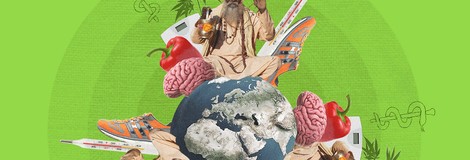Your podcast discovery platform
Curious minds select the most fascinating podcasts from around the world. Discover hand-piqd audio recommendations on your favorite topics.

piqer for: Global finds Health and Sanity Doing Good
Bangalore-based Rashmi Vasudeva's journalism has appeared in many Indian and international publications over the past decade. A features writer with over nine years of experience heading a health and fitness supplement in a mainstream Indian newspaper, her niche areas include health, wellness, fitness, food, nutrition and Indian classical Arts.
Her articles have appeared in various publications including Mint-Wall Street Journal, The Hindu, Deccan Herald (mainstream South Indian newspaper), Smart Life (Health magazine from the Malayala Manorama Group of publications), YourStory (India's media technology platform for entrepreneurs), Avantika (a noir arts and theatre magazine), ZDF (a German public broadcasting company) and others.
In 2006, she was awarded the British Print-Chevening scholarship to pursue a short-term course in new-age journalism at the University of Westminster, U.K. With a double Masters in Globalisation and Media Studies from Aarhus Universitet (Denmark), University of Amsterdam and Swansea University in Wales, U.K., she has also dabbled in academics, travel writing and socio-cultural studies. Mother to a frisky toddler, she hums 'wheels on the bus' while working and keeps a beady eye on the aforementioned toddler's antics.
Think You Are 'Different' On Social Media? You Might Be Kidding Yourself
This is a question I have also asked myself: Why am I often a warm mother on Facebook and a serious journalist on Twitter? I use Instagram like a teenager – to drool all over my favourite celebrities – but I would not dare do that on Facebook. A simple Google search will spew out several consolations to allay any apprehensions I might have of being a case for Multiple Personality Disorder. I am told in a language that seems to pat me gently, that we are all "different" on social media and each media has its own culture, which we tend to appropriate, even if we are exhibitionists, rude louts and interfering jerks more often than not. Several studies are shoved in my face to prove this point. Don't worry, they all seem to say, you are finer and kinder in real life.
Chiefly, a lot of twaddle.
It is time, as Derek Thompson, the author of this snarky, acidic piece of writing says, to stop being ostriches about our social media personas. What you are on social media is not an artificial construct: it is as real as your real self. The author argues (and effectively, I might add) that the internet is not creating new personalities, but simply allowing people to express facets of their persona that are normally discouraged in the real world. He calls the internet the "kingdom of self-regard". How apt. This article on bbc.com bolsters his argument about how our online activities are an "exercise in reputation management".
Thompson quotes recent studies that confirm his theory – no matter what we say to ourselves, we care a great deal about being watched. Our behaviour and choices change because of an audience, often without us being aware of it.
But, but. We may be "performing" on social media, but that does not necessarily make it false. As Thompson says, the internet is simply able to reveal the “upper and lower bounds of our capacity for empathy and cruelty, anxiety and confidence”. Makes one wonder if our identity indeed lies with our audience, as this author believes.
